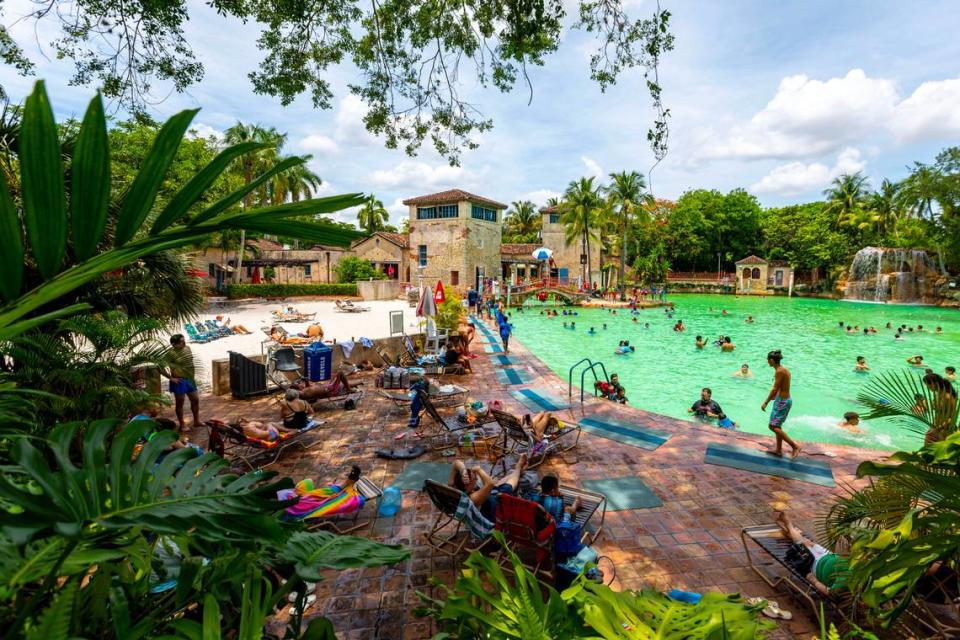Ocean and pool in Florida in ‘bathtub conditions.’ Is it safe to swim? What experts say
As South Florida continues its month-long trend of temperatures in the 90s that feel like more than 105, our sources of relief — a splash in the ocean or plunging into the swimming pool — are also hot, hot, hot.
And who wants to jump into a hot tub when it’s 96 outside?
Water temperatures in the Florida Keys have already hit the mid-90s, seven degrees above normal, the Miami Herald reports.
The seawater temperature in Miami and Miami Beach was 87 Wednesday afternoon, 86 in Fort Lauderdale, 92 in Key Largo and 91 in Islamorada, according to the Sea Temperature website tool.
“Bona fide bathtub conditions that we rarely see,” Brian McNoldy, senior research associate at the University of Miami’s Rosenstiel School, said in an email to the Washington Post Monday.
Is it safe to swim?
We all know the benefits of immersing in hot water in therapeutic sessions at spas or a hot bath at home to relieve sore muscles and joints, reduce stress and even before bedtime to help get a good night’s sleep. But here we are talking about jumping in the ocean or a pool to escape the heat or to work out with a swim.
In general, it’s safe to swim. The water is not boiling so you won’t scald. And some recreational swimming pools, or Olympic-sized pools used for competitions, use aerators — water jets — that draw water from the pool and spray it back in from over the surface to cool the water temperatures by 5 to 10 degrees to make it comfortable for lap swimming or splashing about.
But swimming, training or standing in hot or warm water that is 90 degrees or above for too long can raise your body temperature, leading to hypothermia, exhaustion, dehydration, fatigue, nausea, loss of body fluids through sweat. (Yes, you sweat when swimming.) And even heat stroke.
“Warm water increases your body temperature, which also raises your sweat rate and quickens dehydration. Your body tries to cool itself down through sweat to regulate your body temperature. Profuse sweating can lead to an imbalance of electrolytes, which can effect muscle mobility. Open-water swimming in warm climates can expose you to water temperatures that are too warm, which can cause muscle spasms and severe fatigue,” reports LiveStrong.Com.
The water temperature in much of the #FloridaKeys is 95-97°F on recent afternoons. People are questioning the data or perhaps a bad sensor. I doubt all of the stations are going bad at the same time. The measurements are all taken 1.5 meters (~5 ft) below mean low tide. [1/3]: pic.twitter.com/PBlVTmvmkI
— Brian McNoldy (@BMcNoldy) July 11, 2023
The ideal water temperature

According to USA Swimming, Olympic competition rules mandate a pool water temperature of 79, plus or minus a degree. Water temperatures of 82 degrees and cooler are ideal for competitive swimming and high-intensity swimming. Recreational swimming and moderate exercise can crank the temperatures to 86 to 88-degrees.
That’s swimming pools. Open water swims in bodies of water like the Atlantic or bays pushing into the 90s can be risky at those temperatures.
LiveStrong suggests these ideal water temperatures for various activities:
▪ For lap swimming or racing, 78-82 degrees.
▪ For children and older adults, 82-86 degrees.
▪ For babies, 84-86 degrees.
▪ For those who have obesity, 80-86 degrees.
▪ For those who are pregnant, 78-84 degrees.
Since mid-June, weekly water temperatures across the Gulf of Mexico have soared, reaching record levels for the time of year. So far in 2023, the Gulf is the warmest it's been in the satellite record, surpassing 2020 for the warmest start to a year since at least 1981. pic.twitter.com/bopzoo7BET
— Michael Lowry (@MichaelRLowry) July 11, 2023
Hot water safety tips
▪ Stay hydrated. Even if you’re just going to the beach and gossiping about the latest episode of “The Bear” while waist deep off the shore, drink plenty of water or electrolyte-rich beverages. Avoid dehydrating alcohol or coffee. And apply sunscreen liberally. You can, and will, burn, even if most of your body is submerged.
▪ Remove your bathing cap, suggests U.S. Masters Swimming. Heat is present and lost through the head, and neoprene caps retain the most heat, followed by silicone, latex and cloth. If your hair is long, try braiding it to keep it out of your face when swimming.
▪ Swim near lifeguards in case you get fatigued or disoriented.
▪ Roll over, U.S. Masters Swimming suggests. If the air temperature is cooler than the water temperature — not a certainty in Florida — expose as much skin as you can to the air. You can often achieve this by rolling over and catching your breath. Do the backstroke. Even if the air outside is as hot, or hotter, than the water, breezes against your wet skin can temporarily cool you off.
▪ Take a break and seek shade or AC. Listen to your body. If you’re feeling sluggish or worse, get out of the water, towel off, sit down in a cooler location, drink water or an electrolyte beverage like Gatorade and chill a bit.
How hot did it get in Florida? And will we break more records? What the forecast says

